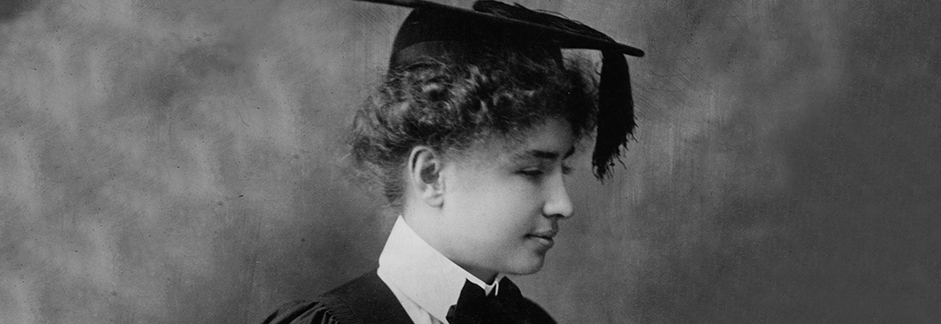Helen Keller remains an indomitable figure in modern history, a paragon of resilience and intellect who transcends the conventional parameters of ability and disability. Her life exemplifies the embodiment of the Baha’i principles of service, equality, and the pursuit of knowledge. This exploration of Helen Keller as an author, activist, and Baha’i will elucidate her profound philosophical inquiries, activism for social justice, and her pivotal role within the Baha’i community.
Born in 1880 in Tuscumbia, Alabama, Keller’s early years were marred by personal tragedy as she lost her sight and hearing due to an illness at the age of 19 months. This profound isolation sparked an unquenchable thirst for communication, ultimately manifesting in her relationship with her teacher, Anne Sullivan. Sullivan employed innovative techniques to facilitate Keller’s understanding of language, fostering a lifelong passion for literature and intellectual engagement. Keller’s incapacity to perceive the world in the conventional sense may initially appear as a limitation; however, it kindled a unique perspective that would later inform her literary and social contributions.
Keller’s authorship transcended mere literary articulation; it served as a vehicle for challenging prevalent societal norms. Her landmark work, “The Story of My Life,” offers an introspective chronicle that not only illuminates her personal journey but also serves as a testament to the resilience of the human spirit. Through her writing, Keller adeptly navigates the complexities of human emotion, interlacing themes of perseverance and spiritual pursuit. The narrative unfolds as an inquiry into the nature of existence, compelling readers to reflect on their own perceptions and the societal frameworks that govern them.
Moreover, Keller’s engagement with the Baha’i Faith was not incidental but integral to her worldview. Introduced to the principles of Baha’i by her mentor, Sullivan, Keller embraced the teachings of Baha’u’llah, advocating for concepts such as global unity, gender equality, and interfaith harmony. Each of these principles resonates profoundly within Keller’s writings and activism, suggesting an intrinsic connection between her spiritual beliefs and her relentless quest for justice.
Keller’s activism extended beyond mere literary contributions; she was an ardent advocate for social reform. Her efforts spanned various causes, including women’s suffrage, labor rights, and racial equality. She was an instrumental figure in the American Civil Liberties Union, championing the rights of marginalized groups and employing her visibility as a means of mobilization. Keller recognized that social change necessitated an intersectional approach, positing that the liberation of one group invariably contributes to the emancipation of all. This understanding underpinned her staunch belief in the unity of humanity, a cornerstone of Baha’i teachings.
The notion of service lies at the heart of both Keller’s activism and the Baha’i Faith. Instilled with a fervent belief in the dignity of all individuals, Keller dedicated her life to the service of others. She engaged with the disabled community, leveraging her platform to dismantle stereotypes and promote accessibility. Her impassioned speeches and writings echoed the Baha’i tenet that “the earth is but one country, and mankind its citizens,” reflecting her commitment to global citizenship.
Keller’s philosophy, steeped in the Baha’i teachings, underscores the importance of education as a catalyst for transformation. She believed that access to education could dismantle barriers and foster understanding across cultural divides. Her advocacy for educational reform was predicated on the notion that enlightenment serves as a precursor to societal progress. Thus, Keller’s endeavors were not merely personal; they were imbued with a transcendental urgency that demanded collective action.
In examining Helen Keller’s legacy, it is essential to acknowledge the paradox that encapsulates her life. Although she was unable to experience the world through sight or sound, her profound insights into the human condition resonate with clarity. This duality evokes a sense of fascination, as she articulates the nuances of existence with an undeniable eloquence. The depth of her understanding serves as a poignant reminder that perception is multifaceted; her experiences exemplify the principle that the senses may not be the sole arbiters of wisdom.
The interplay between Keller’s literary contributions and her Baha’i beliefs invites a consideration of spiritual transcendence. Her contemplations on the essence of life assert that true understanding transcends physical limitations. Keller’s writings provide not just a window into her resolute spirit but also a mirror reflecting the potential for enlightenment in all human beings. This spiritual awakening is intricately woven into the fabric of Baha’i teachings, which advocate for the cultivation of virtues and the advancement of knowledge.
In conclusion, Helen Keller’s remarkable journey as an author, activist, and Baha’i encapsulates the essence of perseverance, intellectual pursuit, and humanitarian advocacy. Her legacy challenges societal misconceptions about ability and underscores the profound interconnectedness of humanity. Keller’s life exemplifies the Baha’i commitment to service and global unity, prompting a reflection on our collective role in fostering a more equitable world. Ultimately, the richness of her contributions continues to inspire generations, inviting individuals to engage in a deeper exploration of their own beliefs and actions.
